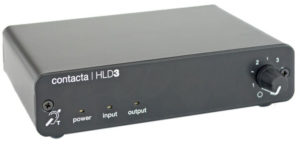by Neil Bauman, Ph.D.
The changeover to digital programming and digital TV is coming on February 17, 2009—that’s less than a year away. If you are like me, you depend on closed captioning (CC) to understand what is said on the TV. Thus you want to be sure that the captions will be working when the changeover comes. However, not all is as easy and simple as it should have been.
Here is Bob McPherson, the head honcho and owner of the Yahoo on-line group called “BH News” with his succinct summary of one of the problems. He writes:
In a nutshell, the crux of the problem lies in flawed design of the favored HDMI interface standard, the gold standard today for interconnecting devices such as DVD players/recorders, etc, to the new high definition TVs (HDTV). The flaw is that the HDMI interface was not designed to pass the closed captioned (CC) signal!
This occurred because the authors of the HDMI protocol assumed that the CC decoding would occur in the peripheral devices (DVD/etc.) producing open captions overlaid on the video stream, which the HDMI IS designed to pass perfectly. Of course that assumption was wrong, as we well know today in practice!
What is needed, simply, is a next generation HDMI standard, that does pass CC data. When or if that will happen, I have no clue.
Why the HDMI anyway? Because the HDMI is a digital interface as opposed to the analog composite or component video connectors used in older equipment, and is able to deliver uncompressed video—which means a much better picture resolution—what we bought that pricey HDTV for in the first place!
So, cutting to the quick, what is the best solution for today?
Best: Buy a new DVD device with an included tuner/decoder ( a DVD recorder, rather than DVD player) where the CC will be decoded and the captions overlaid on the video, and will pass through the HDMI interface.
Better: Buy a DVD player with component video output jacks. ( the red/green/blue ) which will work in many cases, but not guaranteed.
Good: All DVD players have the basic composite video output jack ( yellow) and will work with any set, but at an even lower resolution (picture quality) than the component connection.
For those investing in new equipment for the coming DTV transition, if the purse will allow it, I suggest an HDTV and a DVD recorder with ATSC (digital) tuner, with HDMI connectors on each, which all have now, I believe.



I’m not hearing-impaired but have been enjoying captions since getting a TV with a built-in decoder in 1992. Every movie that I’ve bought on various formats I’ve watched a second time with the captions turned on. I’m hoping to get a new HDTV soon and a Blu-Ray player, but since it seems that closed-captions will not work through HDMI I think I will wait until that is straightened out.